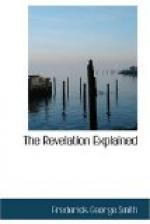This company of souls that the apostle saw reigning with Christ above were those who had had part “in the first resurrection,” which had made them “blessed and holy.” They were not on earth; they were disembodied spirits above, hence had not been literally resurrected. The Scriptures clearly teach that mankind in their ordinary condition are “dead in trespasses and in sins,” and that through salvation, which makes them “blessed and holy,” they are “quickened” to a new life in Christ. Eph. 2:1. That this is Scripturally “the first resurrection” is proved most positively by the words of Christ—“Verily, verily, I say unto you, the hour is coming, and now is, when the dead shall hear the voice of the Son of God: and they that hear shall live. He that heareth my word, and believeth on him that sent me, hath everlasting life, and shall not come into condemnation, but is passed from death unto life.” John 5:25, 24. Although many other proofs could easily be given, this of itself is sufficient to establish the point that the host of early Christians who had “passed from death unto life” in Christ and who gave their lives gladly for the sake of Christ, constituted the ones referred to as having had “part in the first resurrection.” According to verse 6 it was only on those who had part in the first resurrection that the second death had no power. The church at Smyrna received the sure promise from Christ himself that they should “not be hurt of the second death” (chap. 2:11); and this shows beyond all question that even at that early date they had had part in this first resurrection that makes men blessed and holy.
It is the trick of Beelzebub to deceive souls by causing them to overlook the fact that this first resurrection that made men blessed and holy is of a spiritual nature and to fix their hopes in two literal resurrections at the end. There will be but one literal resurrection then, as is clearly shown by the account given of the judgment in this chapter, verses 11-15. The writer of the Revelation declared positively, “Behold, he cometh with clouds: and every eye shall see him, and they also which pierced him: and all kindreds of the earth shall wail because of him.” Chap. 1:7. If this does not prove that there is but one literal resurrection when Christ comes, then I would not know how to state such a fact if I desired. Furthermore, Jesus himself, in the same chapter in which he described “the first resurrection,” says most positively that all the literal dead shall be resurrected at the same time. “Marvel not at this,” he says: “the hour is coming, in the which all that are in the graves shall hear his voice, and shall come forth; they that have done good, unto the resurrection of life; and they that have done evil, unto the resurrection of damnation.” John 5:28, 29. This hour certainly can not signify more than a short period of time. In their efforts to prove two literal




